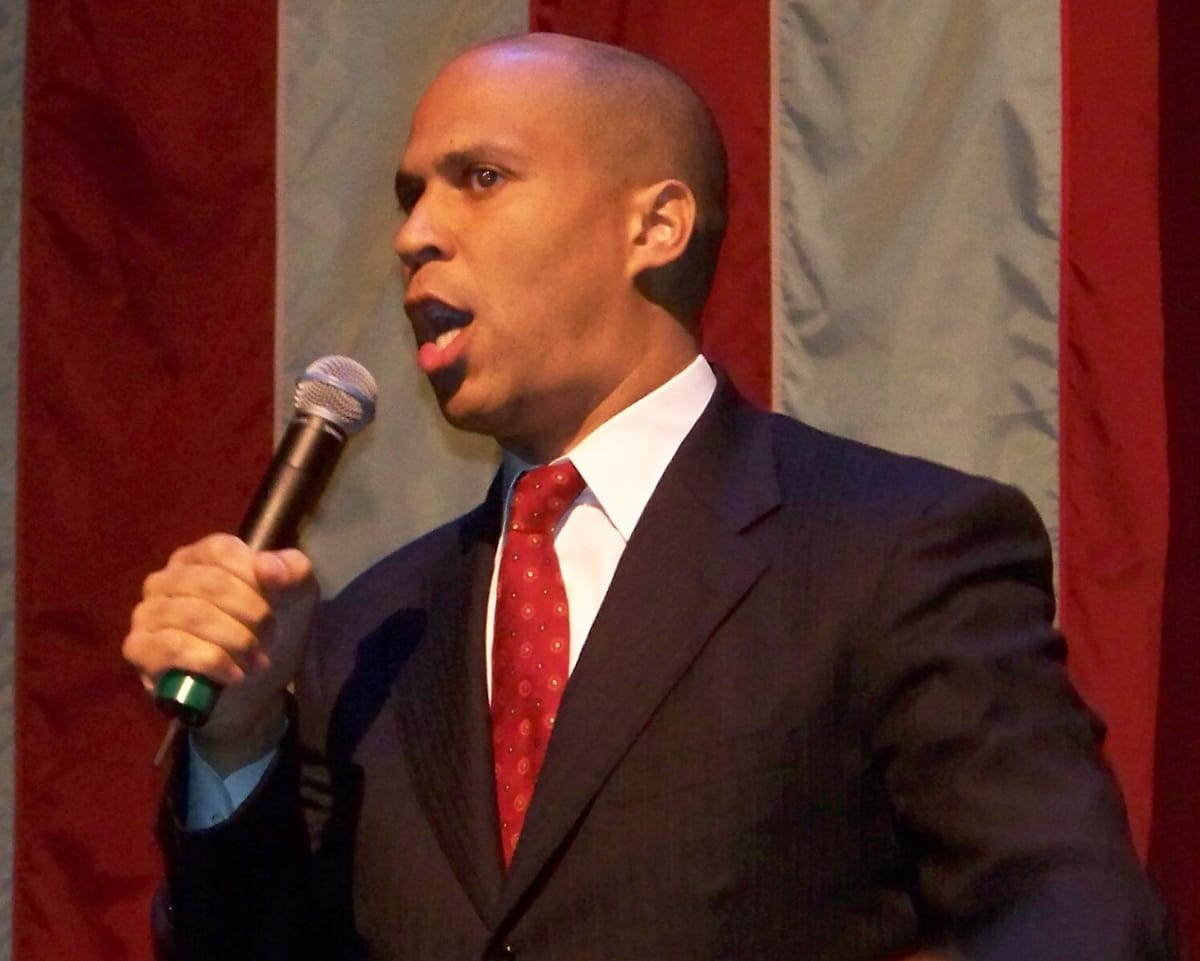Senator Cory Booker Delivers Marathon 16-Hour Speech Criticizing Trump Administration Policies

In a remarkable display of stamina and political resolve, Senator Cory Booker (D-NJ) delivered a marathon speech on the Senate floor that lasted over 16 hours, beginning at 7 p.m. EDT on Monday, March 31, 2025, and continuing into the morning of Tuesday, April 1. The speech, which was not a filibuster but rather an extended protest against the policies of President Donald Trump’s administration, drew widespread attention and highlighted growing Democratic opposition to the president’s agenda.
Booker’s Motivation: “Good Trouble” in a Time of Crisis
Before commencing his speech, Booker released a video on social media explaining his decision to take to the Senate floor. Quoting the late civil rights icon John Lewis, Booker said he intended to create “good trouble” by speaking out against what he described as an unprecedented crisis in American governance.
“These are not normal times in our nation,” Booker declared during his opening remarks. “And they should not be treated as such in the United States Senate. The threats to the American people and American democracy are grave and urgent, and we all must do more to stand against them.”
Booker framed his speech as a response to what he called the Trump administration’s “total disregard for the rule of law, the Constitution, and the needs of the American people.” He cited calls and letters from constituents urging Congress to take stronger action against policies they feel are harming everyday Americans.
Key Themes of Booker’s Speech
Over the course of his 16-hour address, Booker covered a wide range of issues, focusing on what he described as the administration’s harmful policies across multiple sectors:
1. Healthcare and Social Safety Nets
Booker criticized proposed cuts to Medicaid and Social Security, warning that they would disproportionately harm vulnerable populations. He accused President Trump and senior advisor Elon Musk of prioritizing tax cuts for corporations over the well-being of ordinary Americans.
- Medicaid Cuts: Booker highlighted Republican discussions about reducing Medicaid funding under the guise of eliminating “waste, fraud, and abuse.” While GOP leaders insist that benefits will remain untouched, Booker argued that such cuts would inevitably impact low-income families.
- Social Security: He expressed alarm over potential changes to Social Security offices overseen by Musk's Department of Government Efficiency, describing them as part of a broader effort to dismantle critical safety nets.
2. Immigration
Booker condemned Trump’s immigration policies, including mass deportations under the Alien Enemies Act and restrictions on asylum seekers. He read letters from constituents who had been directly affected by these policies, including families separated at the border.
- “This administration has turned its back on our values,” Booker said. “We are a nation built by immigrants, yet this president treats them as enemies.”
3. Public Education
The senator criticized cuts to public education funding and efforts to expand school voucher programs that divert resources from public schools. He argued that these policies exacerbate inequality and undermine access to quality education for all children.
- “Public education is one of the cornerstones of our democracy,” Booker stated. “Yet this administration is starving it while propping up for-profit institutions that fail our students.”
4. Economic Inequality
Booker took aim at Trump’s economic policies, including tax cuts that disproportionately benefit wealthy individuals and corporations. He argued that these measures have widened income inequality while failing to address rising costs for housing, healthcare, and education.
- “In just 71 days, this president has inflicted harm after harm on Americans’ safety, financial stability, and any sense of common decency,” Booker said.
Constituent Voices: Letters from Everyday Americans
Throughout his speech, Booker read excerpts from letters sent by constituents who have been affected by Trump’s policies. These personal stories added emotional weight to his arguments:
- A single mother from Newark wrote about losing access to Medicaid for her children due to administrative hurdles.
- A retired teacher expressed fear over potential Social Security reductions that could leave her unable to afford basic necessities.
- An immigrant family shared their anguish over being separated at the border under new deportation policies.
“These are real people with real struggles,” Booker said. “Their voices deserve to be heard in this chamber.”
Notable Moments
Booker’s speech featured several standout moments that captured public attention:
- Constitutional Defense: At one point, Booker held up a copy of the Constitution and accused Trump of violating its principles. “This document is not just words on paper—it is a sacred trust between our government and its people,” he declared.
- Tributes to John Lewis and John McCain: Booker invoked the legacies of late Congressman John Lewis and Senator John McCain as examples of principled leadership in times of crisis.
- Engagement with Colleagues: Throughout his speech, Booker occasionally paused to take questions from fellow Democratic senators like Chris Murphy (D-CT) and Lisa Blunt Rochester (D-DE), allowing him brief moments of rest while maintaining control of the floor.
Historical Context: Not a Filibuster
While lengthy speeches are often associated with filibusters—procedural maneuvers used to block legislation—Booker’s address did not qualify as such because it was not tied to a specific bill or nomination. Instead, it was an effort to draw attention to broader issues facing the country.
The longest Senate speech in history remains Strom Thurmond’s infamous 24-hour filibuster against the Civil Rights Act of 1957. However, Booker's speech ranks among the longest non-filibuster addresses in recent memory.
Reactions
Support
Democrats praised Booker’s speech as a bold stand against Trump’s agenda:
- Senate Majority Leader Chuck Schumer (D-NY) called it “a powerful reminder that we must fight for what is right.”
- Progressive groups like MoveOn.org celebrated Booker’s endurance as an example of leadership in challenging times.
Criticism
Republicans dismissed the speech as political theater:
- Senator Mitch McConnell (R-KY) called it “a waste of time” that distracted from important legislative work.
- White House Press Secretary Sarah Huckabee Sanders accused Booker of grandstanding for media attention.
Public Response
Booker’s marathon speech quickly became a trending topic on social media platforms like X (formerly Twitter) and YouTube:
- Over 40,000 viewers tuned in live on YouTube at its peak.
- Hashtags like #StandWithCory and #GoodTrouble trended nationwide.
Many supporters praised Booker for amplifying voices often overlooked in political debates. Critics argued that such speeches do little to effect real change without accompanying legislative action.
Implications
Booker’s speech comes at a critical moment for Democrats:
- Party Unity: The address may help rally progressive voters frustrated by recent compromises with Republicans on spending bills.
- Midterm Messaging: As Democrats prepare for the 2026 midterms, Booker’s critique could serve as a blueprint for framing opposition to Trump’s policies.
- Presidential Ambitions: Some analysts speculate that Booker’s high-profile stand may signal interest in another presidential run in 2028.
Conclusion
Senator Cory Booker’s extraordinary 16-hour speech stands as both a critique of President Trump’s administration and a call to action for Democrats seeking to counter its policies. While its immediate impact remains uncertain, the address has succeeded in drawing attention to pressing issues facing Americans—and in reminding Congress that moments of crisis demand bold leadership.
As Booker himself said during his address: “Future generations will look back at this moment and ask one question—where were you?”




